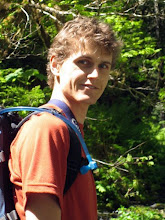I had grown accustomed to the quiet smallness of Moldovan life, before this trip to neighboring Romania. Upon entering Romania, the first observation among my colleagues and I was the non-bumpiness of the road. Shortly thereafter, we also made note of the relative scarcity of the Romanian population. Moldova is one of the most densely populated countries in Europe, with some 4.1 million people in under 34,000 km2, while the 22.2 million Romanians enjoy over 238,000 km2. (Moldova density, 122/km2; Romania density, 93/km2; USA density, 31/km2) But adjusting to the rarefied geography took little time. I moved on to more lasting impressions, such as the grandeur of the religious edifices and the brilliant plasticity of colorful Romanian lei.
Mai departe...
Today, my fellow travelers and I inched slightly closer to the Carpathians, finally emerging from our taxi (read: clown car) in the small town of Voronet. The journey there included smile-inducing passages through forests, near craggy rock outcroppings, and over snow-covered, rolling hills. The Voronet monastery is its small church, a 'Sistine Chapel of the East.' I'll leave the back-story of this church to the good people at Wikipedia and Lonely Planet. I'd also like to leave further Sistine Chapel comparisons for those who have actually seen both. I will say, however, that the frescos on this church were impressive beyond well beyond my expectations. The church is small compared to the enormous towers and cupolas of more modern Orthodox buildings, but Voronet's humble form and splayed, Romanian-style roof still manage to capivate its visitors, who stroll in slow arcs as though sneaking through the classical wing of a musem.
Pictures to come. I'd love to continue this post, but my fellow travelers seem to enjoy loud conversations -- loud, probably so they can hear each other over the TV nobody's watching. There is much to share, but I'll wait until I can hear my own thoughts, instead of hacking out this poor-quality nonsense.
Happy. Thank you. More Please.
13 years ago


